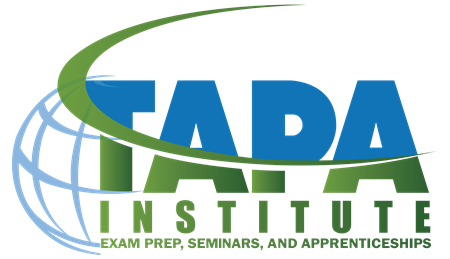How to Conquer the CPA Exam with Smarter Study and Guided Support
The journey to a professional accounting qualification may be daunting. Having much material to learn, a short time, and a lot to lose, a large number of candidates find it difficult to maintain focus and motivation. It is not just in studying hard but also in studying smart, which is preparing for it with structure and strategy and with an expert's help, and this is success. This blog discusses ways in which planning and mentorship would make the CPA exam a certain attainable objective. It is dedicated to the readers with great honor of Dr. Sabine Charles and the quality services that TAPA Institute has done.
Crafting Your Strategic Journey
Learning to master is not in textbooks alone but in making a realistic and a personal plan that is conceived. It is too easy to get lost in studying materials without guidance just to lose track halfway. Begin by evaluating your weaknesses and strengths. Determine the areas to work on, set milestones to be achieved in each area, and set up goals to be achieved every week.
In this case, as an example, rather than an ambiguous goal such as "study accounting," formulate a specific achievable goal: learn how to recognize revenue by Friday. This is a way of bringing order and responsibility. In addition, do not forget about short breaks and buffer time. Any unexpected problem, work, family life, or even tiredness can so easily derail your schedule, and a flexible plan will help you go through them without being burned out.
The true point of difference is consistency. A well-organized plan not only guarantees coverage; it will create confidence. As long-lasting, sustained attempts are put in place, these results lead to high understanding and test-straddling strength.
Building Confidence Through Smart Study
Learning concepts comprehensively is much more significant than memorization. In CPA Tutoring, simulation questions, or those that are fact-based on scenarios, will not respond to shallow recollection but rather to conceptual agility. This is the reason why every subject is to be treated with inquisitiveness. Ask yourself: Why is there this rule? How does it relate to other accounting principles? This reflective practice develops long-term memory..
Most questions to be practiced should be considered as diagnostic and not merely as drills. It is not about finishing hundreds of items but rather analyzing the mistakes. Why did you answer a question incorrectly? Did you misinterpret the idea, or did you misread the situation? It is wise to be able to review and learn the lessons and identify weaknesses in your learning prospects.
This will condition your mind over time to understand patterns, think, and use knowledge in a flexible manner, which is exactly what is required of you in high-pressure testing situations.
The Role of Expert Mentorship
According to isolation, a single study is isolated. With a professional's help, the learning process and motivation level increase dramatically. And there is where mentorship provided by Dr. Sabine Charles really comes in. Her experience in both the accounting and auditing industries and academics makes her more than an instructor; she is a strategist, organizer, and motivator.
Her individualized approach to teaching makes sure that each candidate gets personalized feedback, realistic training, and anxiety management instruments. Outside of the academic preparation, she also assists the aspirants to develop professional confidence, which is a crucial element of success, typically not realized.
Mentorship takes the learning process out of the intense individualism of hard work and turns it into a mentored process. Many candidates learn to not only perfect complex topics but also, under her leadership, learn to tackle complex matters with clarity and confidence.
Managing Stress and Sustaining Momentum
The most serious study schedules will stop functioning once the stress is not handled well. Being ready to attain a big accounting qualification is a test of patience and intelligence. Sleep and food depletion and absence of resting can easily mess things up.
Create a recharge and revitalization in your routine. Work out, be mindful, and make sure that you rest for whole days every now and then. When you are not tired, your brain does the greatest job in the process of learning. It is pointless struggling to go when one is tired and one is just getting tired.
Do not be a perfectionist—not all the sessions will be that successful. When you miss a study day, there is no need to panic. Adapt and keep on instead of giving up or over rewarding. Constant improvement will always be more than brief burnout.
Your peers' or your mentor's assistance also keeps you balanced. Responsibility squads or weekly visits provide support and insight and make you understand that you are not alone on this hard path.
Maximizing Practice with Simulations
When the test date changes to application reading. The timed drills and simulated testing assist you in developing mental endurance that you will need when testing in a real-life setting. It is not only important to do them but also to go over them later in a thorough way.
These assessments are to review your performance after each simulation: Which are the areas taking more time? Which topics felt uncertain? This introspection makes each time of practice a quantifiable development.
Continue going through previous work as well. Even though you have already studied some subject, refresh up on it every now and then. Restating older ideas to ensure you can remember information and the ability to integrate the information works best through revisiting. Your preparation changes over time as it develops to become memorization and then mastery.
Embracing Flexibility and Personalization
The situation of every candidate varies, with some having to handle a job, family, or having to resume studies after a pause. This is why it is necessary to be flexible. Strict study models are usually frustrating, but adaptive systems help you to be balanced.
When you want to have interactive discussions, then select live online classes. In case of frequent variations in your schedule, treat the recorded sessions with mobile study materials so that you can be flexible. Although there are those learners who are helped by the mini-reviews that might be done daily, some need not be done more than once they are on a focus block. It is aimed at creating a system that favors your lifestyle and does not limit it.
At the core of the TAPA Institute approach is this philosophy. Candidates have the flexibility of customizing their preparation through their platform, combining self-paced modules, live instruction, and tracking their progress. It is managed with stress-management methods and individual mentoring to produce a holistic preparation and success lasting in the long term.
The Final Weeks: Turning Readiness into Confidence
During the last weeks before the test, refinement as opposed to overloading is what you ought to aim at achieving. Substitute intensive reading with full-length simulative and error-log analysis of readings and specific review of difficult concepts.
Sleep becomes something you cannot even negotiate on. The brain should have the chance of resting properly in order to consolidate the new information and be able to focus. This is costing many candidates points due to over-studying at the expense of taking a rest. Continuously sleep and eat to keep your mind and body active.
Create your final checklist: train your practice in time, analyze your errors, repeat in terms of regulations, and get confidence in your brightest points. At this point it does not matter whether you are learning anything new again, but only to sharpen the recall and control under examination pressure.
Why Specialist Support Makes the Difference
By collaborating with a specialized program, there will be a complete difference between being lost and feeling prepared. Good teaching, organized resources, and managed responsibility will bring your performance to the next level, higher than just being a self-study.
Your cooperation with expert workers can provide you with experience in working with strategies, practical experience, and personal guidance. Technical and emotional preparation programs like TAPA Institute are focused on making sure that the candidates not only pass but also succeed.
Candidates obtain much more than academic training with the guidance and care of such professionals as Dr. Sabine Charles. They acquire mindset training, confidence training, and effective study skills. Her systematic attitude makes preparation a path of professional development, strength, and achievement.
Your Next Step: Commitment and Action
The right towards the future requires dedication. Plan your schedule, pack your resources, and start with the first step by enrolling in a structured program where you are assisted at each intermediate. Having the right mentors around you and knowing exactly what you want is a sure way to succeed.
Do not forget, preparation has nothing to do with the number of hours studied but rather with a good study. With such an experienced staff as at TAPA Institute, your hours of studying are immediately converted to confidence and results. Under the mentoring of Dr. Sabine Charles, you will know how to channel your energies on what really counts, reduce stress, and take your test with calm, collected confidence.
From Candidate to Professional
Obtaining a leading accounting degree is not just a test of knowledge alone but a process of discipline, concentration, and mental strength. It is possible to make the CPA exam a stepping stone that will mark your career advancement with proper planning, the advice of experts, and specific preparations. Starting to steer your own ship makes you a success; always be confident, trust the process, and new possibilities in your accounting profession start to open.

